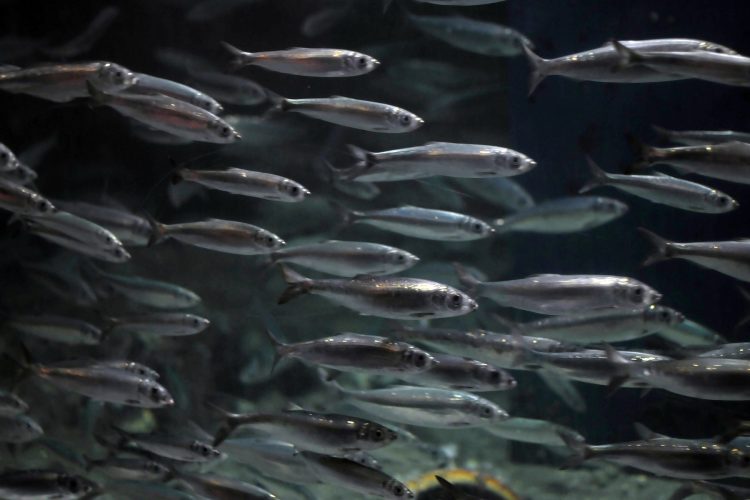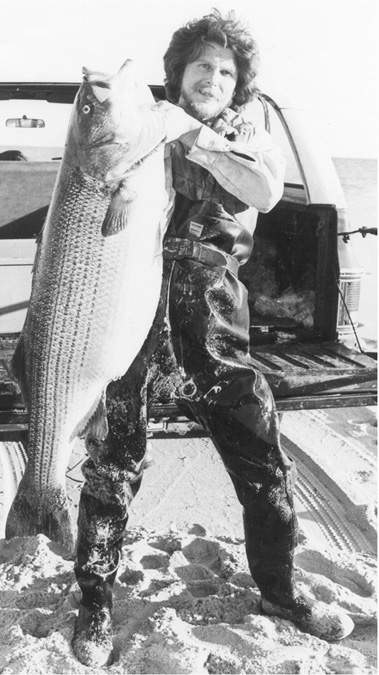Atlantic Herring and Legendary Late-Season Stripers
Historically, the final days of the fall run find big southbound stripers feeding on Atlantic herring close to the beach.

The fall run is a chaotic and wonderful time to be a striped bass angler. Even though fishermen throughout most of the Northeast can count on about two solid months of fishing for migrating stripers between Labor Day and New Year’s, there’s a “blink-and-you’ll-miss-it” feel that causes us to cast with a sense of urgency that wasn’t present back when the bass were migrating north. To help make the most of this year’s fall striper migration, we’ve compiled this “Survival Guide” by surveying some of the most dedicated surfcasters in the Northeast and sharing some of our favorite tips for the final months of the striper season.
Striper fishing lore is full of stories of giant stripers moving down the beach long after the vast majority of fishermen have put away their rods for the season. The witnesses of these late-season blitzes—whether hunting waterfowl, walking the dog, or taking a lunch break—always seem to be too far away from their fishing equipment to take advantage of the striped bass bounty that’s fallen into their laps. In some tellings, the angler returns the following day, rod in hand but, of course, the fish have gone, and no sign of life remains on the cold, windswept beach.
There are just enough examples of late-season success to lend credence to some of these fish tales: Tony Stetzko’s November 73-pounder on Cape Cod, the late-November big-fish blitzes on Block Island in the 1980s, Billy Legakis’ late November and December 50-pounders from Long Island, and the legendary Island Beach State Park Thanksgiving Day blitzes in New Jersey.

There is only one thing that would keep stripers around past the time the water drops from their comfort zone—a tremendous source of food. But with the bunker gone, the mullet history, the anchovies vanished, and even the spearing thinned out, what’s left? The very same bait that entices giant bluefin tuna to travel into frigid Canadian waters. Atlantic herring.
For most of the year, Atlantic herring are well beyond the reach of surfcasters. In fact, they’re well beyond the reach of most Northeast boat fishermen, too. They hang in cool, nutrient-rich waters feeding on krill, copepods, and small fish. But as winter takes hold, herring make a move south, and occasionally head inshore. Anglers itching to wet a line target these herring from lighted docks on winter nights long after the stripers have gone.
Some very large bass will linger long enough to meet these herring as they move down the coast. This is not the type of fishing you can set your watch to, though. It is very much at the whim of the herring, whether they decide to wander close enough to shore to allow stripers to trap them against a beach or inside an inlet.
Along the beach, gannets are a good indicator of the presence of herring. These large seabirds are easily distinguished from gulls by their divebombing feeding behavior. Gannets can also be misleading, however. These birds are capable of diving deeper than 30 feet in search of prey, so, unlike gulls, gannets do not rely on schools of predatory fish to drive baitfish to the surface.
The later you get in the season, the less likely it is you’ll catch fish on any given trip. After four or five outings without a hit, giving it up for the year is definitely the smart option. You could fish every night from Thanksgiving to Christmas and not find a single fish—unlike the spring and early fall, the odds of eventually finding fish are not in your favor late in the season. But, you never know, a big southbound school might make a pit stop at one of the beaches, boulder fields, or bays where you keep your late-season vigil.
When the wind sends a chill through your bones and you consider swapping your surf rod for your TV remote, imagine what it’d be like to stumble across a group of giant stripers while alone on the beach, and make another cast.
— from the October 2012 Issue of On The Water
Related Content
3 on “Atlantic Herring and Legendary Late-Season Stripers”
-
Robert Ketterer I wish that I kept the pictures of the Stripers I caught , on L.B.I. in New Jersey??? Just had back surgery , for herniated discs . But I still went Fishing 🦦🦦🎣🎣🎣 , and then back to the Hospital!!! Robert Ketterer
-
Pete I caught a nice size schoolie on A Sabiki rig two years ago fishing for herring.
-
Haidyn Fishing for herring is illegal in NJ
-
Leave a Reply